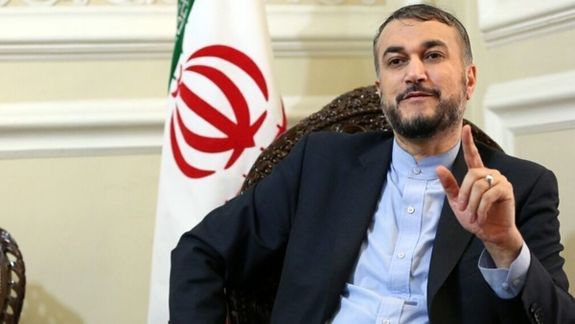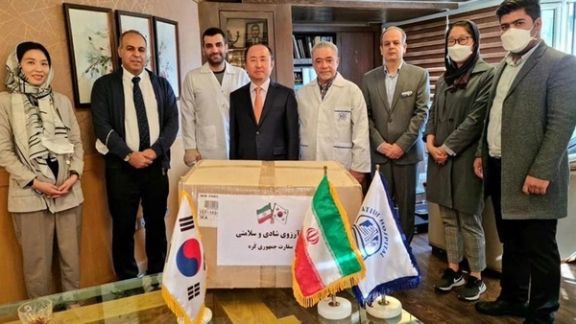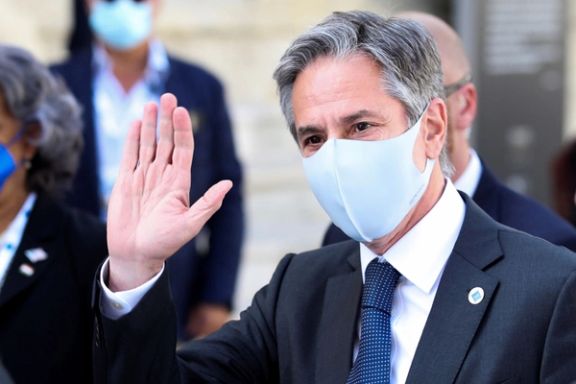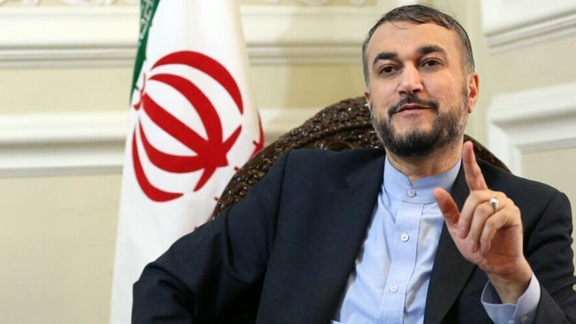Iran's Foreign Minister Slams US Negotiating Posture In Nuclear Talks

Iran’s foreign minister has criticized the United States for its posture in JCPOA nuclear talks, demanding lifting of all US sanctions imposed since 2018.

Iran’s foreign minister has criticized the United States for its posture in JCPOA nuclear talks, demanding lifting of all US sanctions imposed since 2018.
Hossein Amir-Abdollahian tweeted Tuesday that “The White House calls for negotiations with Iran…Yet it simultaneously imposes new sanctions on Iranian individuals & entities”.
The US Treasury Department on October 29 announced new sanctions on a few Iranian officials and companies for their role in the Unmanned Aerial Vehicle (UAV) program of the IRGC and its Qods (Quds) Force. Days earlier, drones suspected to have been supplied by Iran hit a US base in southern Syria.
The Iranian foreign minister fired off a second tweet saying that the goal of the nuclear talks should be “tangible results on the basis of respect for mutual interests”. He added that the remaining members of the Joint Comprehensive Plan of Action (JCPOA) should be ready for talks.
Iran has been hardening its posture in recent days, demanding the full removal of all US sanctions imposed since 2018, when former president Donald Trump withdrew from the JCPOA. It is has also said it will not have any contacts with the US until all sanctions are lifted.
Amir-Abdollahian has tested positive for Covid-19 and is in quarantine.

Iran’s hardening posture in the nuclear talks this week and its continuing economic crisis, generated starkly opposing commentaries in Tehran media on Monday.
Conservative commentator Abdollah Motevallian has outlined the Islamic Republic's policy and expectations of the negotiations from the perspective of the revolutionary guards (IRGC) ina front-page commentary in the IRGC's daily newspaper Javan while acknowledging that many political activists in Iran and abroad question the Raisi administration's foreign policy, particularly regarding the JCPOA.
He stressed that Raisi looks at the JCPOA and nuclear negotiations as issues independent of Iran's problems, mindless of the fact that Iranian and other analysts have said repeatedly that Iran needs to get the JCPOA back on track and have the sanctions lifted to begin to solve its worsening economic crisis.
Motevallian outlined Iran's policy about the nuclear deal and negotiations in what he called "the new round of face-off with the West", most probably reflecting IRGC's worldview:
Motevallian explained that Iran will return to its commitments under the JCPOA only if all the sanctions are lifted and a valid international guarantee is given to Tehran that no such sanctions will be ever imposed again.
This is a maximalist position, if it reflects the thinking of hardliners who dominate the government.
On the other end of the political spectrum, reformist daily Arman published an interview with political scientist Pirouz Mojtahedzadeh in which the firebrand reformist academic warned the Raisi administration that foreign policy is not always similar to sabre rattling. Mojtahedzadeh charged that the administration lacks political will, and its negotiating team is devoid of creativity and initiatives.
Mojtahedzadeh stressed: "Diplomacy is a creative art. If someone knows he is not bestowed with that art, he should try to master it. But if he does not know that he does not have it, he will remain as he is and will do nothing." However, he charged that all previous governments in Iran had the same problem.
"I hope Raisi takes leave for a few hours to ponder on why he is president and what is he intends to do to reduce the hardship people have to endure. He should ask himself if he really has a mission for his country to accomplish," Mojtahedzadeh said.
"Raisi should realize that there is no other way to solve Iran's problems in the international arena other than maintaining a positive and constructive communication with the world," he continued, adding that "I do not mean we should necessarily maintain relations with Israel. But what is wrong with being friends with Canada or Australia? We should have good ties even with the United States in order to facilitate trade with the rest of the world. This is what can improve the people's livelihood."
Mojtahedzadeh said that "under the circumstances," he has no hope in the future of the negotiations as long as capable diplomats are not part of the negotiating team or as long as at least their consultation is not sought.

Agreement on a return to the 2015 nuclear deal can come "very quickly" if the US lifts all sanctions imposed by the Trump administration, Iran said Monday.
Speaking at a regular press briefing, foreign ministry spokesman Saeed Khatibzadeh said the US should return to Vienna talks with a "simultaneous and effective lifting of all sanctions" and a "proper implementation plan…[abandon] its previous policy of maintain[ing] parts of the Trump sanctions against Iran, and… [stop] wasting Iran and the 4+1 countries' time and energy with inconsistent arguments to keep parts of the sanctions."
Talks in Vienna over reviving the 2015 deal – the JCPOA, Joint Comprehensive Plan of Action – began in April, but Iran suspended its participation in June. The US took part indirectly in formal talks between the five remaining JCPOA members, China, France, Germany, Iran, Russia, and the United Kingdom.
The ‘4+1’ refers to four permanent members of the United National security council plus Germany, as the original ‘P5+1’ fragmented when the US in 2018 left the JCPOA – signed between Iran and the ‘P5+1’ – before imposing ‘maximum pressure’ sanctions.
The US has said it will lift only sanctions specifically related to the JCPOA, but Iran has argued that sanctions levied by the Trump administration ostensibly on ‘non-nuclear’ grounds were deliberately and openly designed to wreck prospects for reviving the agreement. But some of these sanctions are related to concrete and important matters, such as Iran’s support for militant groups and human rights violations.
There have also been reports that the US has sought additional conditions, including an Iranian commitment to a ‘follow-on’ agreement over defense and security. Sergei Lavrov, Russia’s foreign minister, said Sunday Russia insisted on the revival of the original agreementwith no such add-ons.
Waiting for US action
"We are waiting for Washington to take action," Khatibzadeh said. Stressing Iran’s commitment to the JCPOA multilateral forum, the spokesman said that Iran had not held any "direct or indirect talks" with the US since shortly after Washington left the deal in 2018. He insisted that no talks "in any shape or format" would take place while the US continues sanctions that included punitive actions against third parties, including US allies, trading with Iran.
“The imposition of new sanctions exposes the quite contradictory behavior of the White House,” Khatibzadeh said in reference to Washington's most recent sanctions, related to Iran's drone program.
US President Joe Biden said Sunday the US would “respond to their actions against interests of the US,” referring to the use of what Washington said was an Iranian-made drone in the October 20 attack by militia on US troops in Syria.
Drones are regularly used by Iranian proxies, including Hezbollah and Ansar Allah in Yemen.
Welcoming US goodwill
Reiterating that Iran will finalize a date for resumption of talks in Vienna this week "after conferring with all parties involved including China", Khatibzadeh said Iran welcomed the recent message of US "goodwill" in an E3 statement issued Sunday by Germany, France and the UK Sunday after meetings on the margins of the G20 summit in Rome.
"We hope that what has been referred to as goodwill of the other parties in the statement happens," Khatibzadeh said.
The E3 statement referred explicitly to Iranian concerns, shared by other JCPOA signatories, that the US might again abandon the agreement. The E3 welcomed a commitment from Biden to “to stay in full compliance, so long as Iran does the same.”
While the official news agency (IRNA) highlighted Khatibzadeh's remarks about "Iran awaiting practical action from US" in its headline, the English website of the Revolutionary Guards (IRGC)-affiliated Fars news agency chose "Talks between Iran, US Inconceivable until Removal of Sanctions."
Principlist media was quick to downplay any advantages in the US returning to its JCPOA commitments. In a commentary Monday, Javan newspaper wrote Monday said whether the US did or did not return to the JCPOA had no attraction or relevance for Iran and enumerated conditions Iran required for continuing the Vienna talks.
‘Deceptive’ American terms
"Iran's evident wish is implementation of the JCPOA, precisely and without preconditions and full and simultaneous lifting (not suspension or any other deceptive American term) of unjust US and European sanctions," Javan wrote.
Javan also added that Iran would accept the nuclear limits set by the JCPOA, which it has breached since 2019, once it received "precise, valid and acceptable guarantees that the West will not reimpose sanctions under any other pretext and that there was "logical verification for at least six months" that sanctions had been lifted as required.
The newspaper also suggested the UN Security Council guaranteed to sanction the US and Europe if they again failed to uphold the JCPOA, which the council endorsed in 2015.

Iranians are criticizing the South Korean embassy in Tehran for donating 2,000 Covid masks to a hospital while Seoul keeps $7 billion of Iran’s frozen funds.
Ambassador Yun Kang-hyeon visited a private hospital in Tehran on Sunday and donated Covid masks, in what conservative media in Iran and several prominent citizens criticized as an insensitive act.
Some media outlets called the ambassador’s donation a “humiliating act” as Seoul has refused to release $7 billion of Iran’s money frozen by two of its banks, since the US imposed banking sanctions on Iran in 2018.
The embassy tweeted pictures of the ambassador’s visit to the hospital showing a few cartons of masks. This led to negative reactions, with Alef conservative website not only criticizing the embassy but also attacking the private hospital for accepting the gift.
“Is anyone in this hospital reading newspapers or following the news to know what South Korea has done to us during sanctions?”, the newspaper asked.
Iran foreign ministry spokesman Saeed Khatibzadeh also reacted to the news on Monday calling the donation “a joke”.

US Secretary of State Antony Blinken said on Sunday that the United States was "absolutely in lock step" with European allies on getting Iran back into the 2015 nuclear deal.
But the top US diplomat added it was unclear if Tehran was willing to rejoin the talks in a "meaningful way."
Iran stopped participation in multilateral talks in Vienna in June, refusing to announce an exact date for their its return.
Blinken's remarks in an interview with CNN on Sunday come a day after the United States, Germany, France and Britain urged Iran to resume compliance with a 2015 nuclear deal in order to "avoid a dangerous escalation."
The accord, under which Iran curtailed nuclear work seen as a risk of developing nuclear weapons in exchange for a lifting of global sanctions, unraveled in 2018 after then-President Donald Trump withdrew the United States, prompting Tehran to breach limits on uranium enrichment set by the pact.
"It really depends on whether Iran is serious about doing that," Blinken said about Iran rejoining the nuclear talks. "All of our countries, working by the way with Russia and China, believe strongly that that would be the best path forward", he added.
Leaders of the four countries hoping to persuade Tehran to stop enriching uranium to near-weapons-grade levels, said on Saturday they wanted a negotiated solution. Iran is enriching uranium to 20 and 60 percent purity, which has no civilian use. The process reduces the time Tehran would need to develop a nuclear device.
"But we do not yet know whether Iran is willing to come back to engage in a meaningful way," Blinken said on Sunday. "But if it isn't, if it won't, then we are looking together at all of the options necessary to deal with this problem."
Iran's foreign minister said separately on Sunday that if the United States was serious about rejoining Tehran's 2015 nuclear deal with world powers, President Joe Biden could just issue an "executive order," the state-owned Iran newspaper reported.
"It is enough for Biden to issue an executive order tomorrow and they (U.S.) announce they are rejoining the pact from the point where his predecessor left the deal," Iranian Foreign Minister Hossein Amirabdollahian said. "If there is a serious will in Washington to return to the deal, there is no need for all these negotiations at all."
But this fails to take into consideration the different current circumstances including the complexity of the sanctions and the reversal of gains Iran has made in its nuclear program since 2018.
Talks between Iran and world powers aimed at salvaging the deal, which started in April, are slated to resume at the end of November, the Islamic Republic's top nuclear negotiator said on Wednesday.
With reporting by Reuters

Iran's foreign minister insists that to revive the 2015 nuclear deal, the US must first show "good will" and turn the clock back to 2018 when it left the deal.
In an exclusive interview published Sunday by the government mouthpiece, Iran newspaper, the top Iranian diplomat said Tehran expects the US to return to the time before Trump sanctions began, if the President Joe Biden seriously wishes to revive the agreement that his predecessor abandoned. Iran will also return to the same point in the Joint Comprehensive Plan of Action (JCPOA), he said.
Amir-Abdollahian insisted that there is no need for so much negotiation and a "simpler solution" to revive the JCPOA would be if Biden issues an executive order and return to where things were in May 2018.
"We hear [about the US] will and intention [to do so] in their messages but we don't see it in their actions," he said while reiterating that the US should release $10 billion of Iran's frozen funds to prove its "good will", because Iran is very distrustful of their intentions.
A return to 2018 for Iran would mean the lifting of "all Trump sanctions" many of which are not directly or even indirectly related to Iran's nuclear activities. Iran will in return set its nuclear program to the same pace and form as it was in 2018, Iranian officials say. But this fails to take into consideration the different current circumstances including the complexity of the sanctions and the reversal of gains Iran has made in its nuclear program since 2018.
The JCPOA put a 3.65-percent enrichment cap on Iran but since the US withdrawal from the pact, Iran has installed advanced, more powerful centrifuges such allowing it to reach faster and much higher levels of enrichment and has stockpiled 20-percent and 60-percent enriched fissile material that has no civilian use. Iran may retire its advanced centrifuges and give up its stockpile of highly enriched uranium, but it gets to keep the know-how and experience gained in the process.
Arguing that Iran has gained nothing from the JCPOA, including the lifting of UN sanctions in the years following its conclusion, the top Iranian diplomat alleged that former US president Barack Obama was the first one to violate the nuclear deal and that more violations followed by Trump who withdrew from the agreement. He did not specify what had Obama violated.
Iran could say that six UN resolutions against the country had been lifted with a settlement that six other parties to the JCPOA also agreed on and that the issue of sanctions was solved, "if it had benefitted from the agreement", he said, adding: "There is now a thick document in several hundred pages called the JCPOA which has made things even harder for Iran than the six UN resolutions [that it lifted]," he said.
Iran has also insisted that the US gives assurances not to leave the deal if Tehran abides by its commitments. According to a joint statement issued Saturday by Germany, France and the UK Sunday after a meeting on the margins of the G20 in Rome attended by Biden, Angela Merkel, Emmanuel Macron and Boris Johnson, the US president has agreed to return to JCPOA and stay in the deal. “We welcome President Biden’s clearly demonstrated commitment to return the US to full compliance with the JCPOA [joint comprehensive plan of action] and to stay in full compliance, so long as Iran does the same,” the statement said.
But this is a verbal agreement not a ratified treaty and Iran might not satisfied that a future US government would not once again withdraw from the agreement. Once issue with JCPOA, experts have said, is the fact that Obama avoided presenting it for ratification, which made it easier for Trump to abandon the deal.
In his interview with Iran newspaper, Amir-Abdollahian also rejected “excessive demands” by the US and some European countries to include regional issues in negotiations with Iran. "We have no plans to hold talks with them on regional issues,” he said, insisting that talks will be limited to the nuclear issue and the JCPOA.